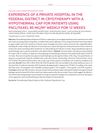Search
for
Sort by
Research
450-480 / 1000+ results
research Chemotherapy-Induced Alopecia
Many patients find hair loss from chemotherapy very distressing, and while treatments like minoxidil and scalp cooling may help, there is no sure way to prevent it.
research Pain Management in Photoepilation
Effective pain relief methods for photoepilation include topical anesthetics, cooling devices, and skin stimulation.

research Chemotherapy-Induced Alopecia: Emotional Distress and Mitigation Strategies
Scalp cooling might reduce hair loss from chemotherapy, but evidence is weak and other treatments are being tested.
research Efficacy of Interventions for Prevention of Chemotherapy-Induced Alopecia: A Systematic Review and Meta-Analysis
Scalp cooling significantly reduces chemotherapy-induced hair loss.

research Treatment of Chemotherapy-Induced Alopecia
Scalp cooling can prevent chemotherapy-induced hair loss, and certain treatments can speed up hair regrowth, but more research is needed for better treatments.

research Therapeutic Strategies for Treating Hair Loss
The conclusion is that we need more effective hair loss treatments than the current ones, and these could include new drugs, gene and stem cell therapy, hormones, and scalp cooling, but they all need thorough safety testing.

research Pathogenesis and Treatment Options for Chemotherapy-Induced Alopecia: A Systematic Review
Scalp cooling is the most effective FDA-approved method to prevent chemotherapy-induced hair loss, but more research is needed for other treatments.

research Prevention and Treatment of Chemotherapy-Induced Alopecia
Scalp cooling can help prevent hair loss from chemotherapy, but treatment should be tailored to the individual and more research is needed.

research Chemotherapy-Induced Hair Loss: The Use of Biomarkers for Predicting Alopecic Severity and Treatment Efficacy
Scalp cooling to prevent hair loss from chemotherapy works for some but not all, and studying hair damage markers could improve prevention and treatment.
research Targeted Therapy and Chemotherapy-Associated Skin Toxicities: Systematic Review and Meta-Analysis
Minocycline reduces acne rash, pyridoxine lowers hand-foot syndrome risk, and scalp cooling lessens hair loss from cancer treatments.
research Strategies to Minimize Pain During Platelet-Rich Plasma Scalp Injections
Ice cooling and vibration can reduce pain during PRP scalp injections without affecting treatment effectiveness.

research Prevention and Treatment of Chemotherapy-Induced Alopecia: A Narrative Review on Emerging Techniques
Scalp cooling and low-power light therapy show promise in reducing chemotherapy-induced hair loss but need more research.

research Scalp Cooling for the Prevention of Chemotherapy-Induced Alopecia: Descriptive Study
Scalp cooling effectively prevents chemotherapy-induced hair loss but requires better pain management.

research Experience of a Private Hospital in the Federal District in Cryotherapy with a Hypothermal Cap for Patients Using Paclitaxel 80 mg/m² Weekly for 12 Weeks
Scalp cooling therapy helped over 80% of women keep at least half their hair during chemotherapy.

research Drugs And Devices In Prevention And Treatment Of Chemotherapy-Induced Alopecia: When And How Should Be Employed
Scalp cooling is recommended to prevent chemotherapy-induced hair loss, but no effective drugs are available.

research Hair Disorders Associated With Anticancer Agents
Some cancer treatments cause different types of hair loss, but scalp cooling can help prevent it.
research Evolution of Long Scalp Hair in Humans
Long scalp hair evolved for cooling and social signaling.

research Hair Removal Using the Long-Pulsed Ruby Laser
Long-pulsed ruby lasers effectively reduce hair for up to 2 years with minimal pain.

research Low-Intensity Ultrasound Protects Human Scalp Hair Follicles From Taxane-Induced Toxicity
Low-intensity ultrasound may protect hair follicles from damage caused by a common chemotherapy drug.
research ERALOP Study: Post Adjuvant FEC-Docetaxel Chemotherapy for Early Breast Cancer: Hair Regrowth in Real Life
After chemotherapy for early breast cancer, 33.4% of patients had long-term significant hair loss, with some hair regrowth over time, but treatments for hair loss were largely ineffective.
research Experience of Professor Wei Yue-Gang Treating Androgenic Alopecia
Traditional Chinese Medicine effectively treats hair loss by addressing specific body imbalances.

research Pathobiology of Chemotherapy-Induced Hair Loss
Chemotherapy causes hair loss by damaging hair follicles and stem cells, with more research needed for prevention and treatment.

research Chemotherapy-Induced Alopecia
Chemotherapy often causes temporary hair loss, which is distressing and needs better treatment and support.
research Chemotherapy-Induced Hair Loss
Chemotherapy often causes hair loss, which is distressing for many, but usually reversible.

research The Medical and Psychosocial Associations of Alopecia: Recognizing Hair Loss as More Than a Cosmetic Concern
Alopecia is linked to various health and mental conditions, impacts life quality, and needs medical attention beyond its cosmetic effects.

research Alopecia in Association with Malignancy: A Review
Hair loss in cancer patients can be related to the cancer itself, treatment, or other conditions, and understanding it is important for diagnosis and patient care.

research Extended Theory of Selective Photothermolysis: A New Recipe for Hair Removal?
Permanent hair removal is hard, but using longer laser pulses at lower power might improve results.

research Minoxidil for Endocrine Therapy–Induced Alopecia in Women With Breast Cancer—Saint Agatha’s Blessing?
Topical minoxidil improves hair loss in 80% of women with breast cancer undergoing endocrine therapy.
research Patient-Reported Outcome Assessment and Objective Evaluation of Chemotherapy-Induced Alopecia
The Hair Check tool can measure hair loss, but patients' own reports are more reliable for assessing hair loss during chemotherapy.